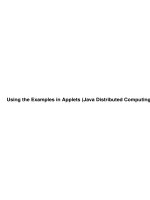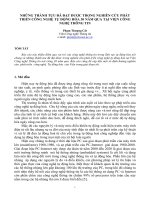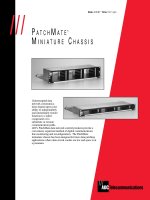Tài liệu Hibernate Tutorial 14 pptx
Bạn đang xem bản rút gọn của tài liệu. Xem và tải ngay bản đầy đủ của tài liệu tại đây (30.25 KB, 10 trang )
Page 1 of 10
Hibernate Tutorial 14 Hibernate in Web Application (2)
By Gary Mak
September 2006
1. Organizing data access in Data Access Objects
Until now, we have put the Hibernate related code inside the servlets. In other words, we are mixing
the presentation logic and data access logic. This is absolutely not a good practice. In a multi-tier
application, the presentation logic and data access logic should be separated for better reusability
and maintainability. There is a design pattern called “Data Access Object” (DAO) for encapsulating
the data access logic.
A good practice when using this pattern is that we should create one DAO for each persistent class
and put all the data operations related to this class inside this DAO.
public class HibernateBookDao {
public Book findById(Long id) {
SessionFactory factory = HibernateUtil.getSessionFactory();
Session session = factory.openSession();
try {
Book book = (Book) session.get(Book.class, id);
return book;
} finally {
session.close();
}
}
public void saveOrUpdate(Book book) {
SessionFactory factory = HibernateUtil.getSessionFactory();
Session session = factory.openSession();
Transaction tx = null;
try {
tx = session.beginTransaction();
session.saveOrUpdate(book);
tx.commit();
} catch (HibernateException e) {
if (tx != null) tx.rollback();
throw e;
} finally {
session.close();
}
}
Page 2 of 10
public void delete(Book book) {
SessionFactory factory = HibernateUtil.getSessionFactory();
Session session = factory.openSession();
Transaction tx = null;
try {
tx = session.beginTransaction();
session.delete(book);
tx.commit();
} catch (HibernateException e) {
if (tx != null) tx.rollback();
throw e;
} finally {
session.close();
}
}
public List findAll() {
SessionFactory factory = HibernateUtil.getSessionFactory();
Session session = factory.openSession();
try {
Query query = session.createQuery("from Book");
List books = query.list();
return books;
} finally {
session.close();
}
}
public Book findByIsbn(String isbn) {
...
}
public List findByPriceRange(int fromPrice, int toPrice) {
...
}
}
According to the object-oriented principles, we should program to interface rather than to
implementation. So we extract an interface “BookDao” and allow different implementation besides
the Hibernate one. The clients of this DAO should only know the BookDao interface and needn’t
concern about the implementation.
public interface BookDao {
public Book findById(Long id);
public void saveOrUpdate(Book book);
public void delete(Book book);
Page 3 of 10
public List findAll();
public Book findByIsbn(String isbn);
public List findByPriceRange(int fromPrice, int toPrice);
}
public class HibernateBookDao implements BookDao {
...
}
1.1. Generic Data Access Object
Since there will be some common operations (such as findById, saveOrUpdate, delete and findAll)
among different DAOs, we should extract a generic DAO for these operations to avoid code
duplication.
public interface GenericDao {
public Object findById(Long id);
public void saveOrUpdate(Object book);
public void delete(Object book);
public List findAll();
}
Then we create an abstract class “HibernateGenericDao” to implement this interface. We need to
generalize the persistent class as a parameter of the constructor. Different subclasses pass in their
correspondent persistent classes for concrete DAOs. For the findAll() method, we use criteria query
instead since it can accept a class as query target.
public abstract class HibernateGenericDao implements GenericDao {
private Class persistentClass;
public HibernateGenericDao(Class persistentClass) {
this.persistentClass = persistentClass;
}
public Object findById(Long id) {
SessionFactory factory = HibernateUtil.getSessionFactory();
Session session = factory.openSession();
try {
Object object = (Object) session.get(persistentClass, id);
return object;
} finally {
session.close();
}
}
Page 4 of 10
public void saveOrUpdate(Object object) {
SessionFactory factory = HibernateUtil.getSessionFactory();
Session session = factory.openSession();
Transaction tx = null;
try {
tx = session.beginTransaction();
session.saveOrUpdate(object);
tx.commit();
} catch (HibernateException e) {
if (tx != null) tx.rollback();
throw e;
} finally {
session.close();
}
}
public void delete(Object object) {
SessionFactory factory = HibernateUtil.getSessionFactory();
Session session = factory.openSession();
Transaction tx = null;
try {
tx = session.beginTransaction();
session.delete(object);
tx.commit();
} catch (HibernateException e) {
if (tx != null) tx.rollback();
throw e;
} finally {
session.close();
}
}
public List findAll() {
SessionFactory factory = HibernateUtil.getSessionFactory();
Session session = factory.openSession();
try {
Criteria criteria = session.createCriteria(persistentClass);
List objects = criteria.list();
return objects;
} finally {
session.close();
}
}
}
Page 5 of 10
For Book persistent class, the “BookDao” and “HibernateBookDao can be simplified as follow.
public interface BookDao extends GenericDao {
public Book findByIsbn(String isbn);
public List findByPriceRange(int fromPrice, int toPrice);
}
public class HibernateBookDao extends HibernateGenericDao implements BookDao {
public HibernateBookDao() {
super(Book.class);
}
public Book findByIsbn(String isbn) {
...
}
public List findByPriceRange(int fromPrice, int toPrice) {
...
}
}
1.2. Using factory to centralize DAO retrieval
Another problem on how to make use of the DAOs is about their retrieval. Keep in mind that the
creation of DAOs should be centralized for ease of implementation switching. Here we apply an
object-oriented design pattern called “abstract factory” to create a DaoFactory for the central point
of DAO creation.
public abstract class DaoFactory {
private static DaoFactory instance = new HibernateDaoFactory();
public static DaoFactory getInstance() {
return instance;
}
public abstract BookDao getBookDao();
}
public class HibernateDaoFactory extends DaoFactory {
public BookDao getBookDao() {
return new HibernateBookDao();
}
}









